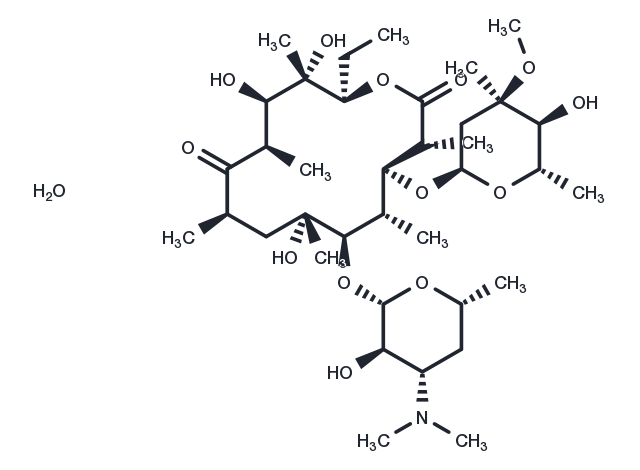Powder: -20°C for 3 years | In solvent: -80°C for 1 year


Erythromycin dihyrate dihydrate is a macrolide antibiotic produced by actinomycete Streptomyces erythreus with a broad spectrum of antimicrobial activity. Erythromycin dihyrate acts by binding to bacterial 50S ribosomal subunits and inhibits RNA-dependent protein synthesis by blockage of transpeptidation and/or translocation reactions, without affecting synthesis of nucleic acid.

| Pack Size | Availability | Price/USD | Quantity |
|---|---|---|---|
| 25 mg | Inquiry | $ 1,520.00 |
| Description | Erythromycin dihyrate dihydrate is a macrolide antibiotic produced by actinomycete Streptomyces erythreus with a broad spectrum of antimicrobial activity. Erythromycin dihyrate acts by binding to bacterial 50S ribosomal subunits and inhibits RNA-dependent protein synthesis by blockage of transpeptidation and/or translocation reactions, without affecting synthesis of nucleic acid. |
| In vitro | Erythromycin dihyrate inhibits growth of P. falciparum with IC 50 and IC 90 values of 58.2 μM and 104.0 μM, respectively[1]. |
| In vivo |
Mice of the ddY strain began to receive Erythromycin dihyrate 7 days after inoculation of EAC cells, and CDF mice begins to receive Erythromycin dihyrate immediately after inoculation of P388 cells[3]. Erythromycin dihyrate (gastric intubation; 0.1-50 mg/kg; 30-120 days) decreases tumor growth from the dose of 5 mg/kg, mice receiving 1-10 mg/kg of Erythromycin dihyrate survives much longer than control mice, Only 10% of mice treated with 5 mg/kg of Erythromycin dihyrate had no evidence of tumor formation on day 60, and the mice are alive even at 120 days after inoculation. However, treatment with 50 mg/kg of Erythromycin dihyrate shortens mean survival time in tumorbearing mice by 4-5 days when it compares to controls[3]. Animal Model: Female ddY mice at the age of 6 weeks with EAC cells or CDF mice at the age of 6 weeks with P388 cells[3]Dosage: 0.1 mg/kg; 0.5 mg/kg; 10 mg/kg; 30 mg/kg; 50 mg/kg Administration: Gastric intubation; 30-120 days Result: Decreased tumor growth and prolonged the mean survival time of mice from the dose of 5 mg/kg, however, the 50 mg/kg dosage shortens the MST in tumorbearing mice. |
| Molecular Weight | 751.952 |
| Formula | C37H69NO14 |
| CAS No. | 59319-72-1 |
Powder: -20°C for 3 years | In solvent: -80°C for 1 year
You can also refer to dose conversion for different animals. More
bottom
Please see Inhibitor Handling Instructions for more frequently ask questions. Topics include: how to prepare stock solutions, how to store products, and cautions on cell-based assays & animal experiments, etc.
Erythromycin A dihydrate 59319-72-1 Erythromycin A Erythromycin A Dihydrate inhibitor inhibit
